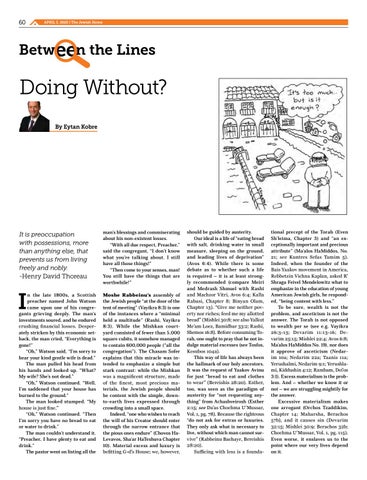60 20
APRIL 3, 2020 | The Jewish Home OCTOBER 29, 2015 | The Jewish Home
Between the Lines
Doing Without? By Eytan Kobre
It is preoccupation with possessions, more than anything else, that prevents us from living freely and nobly. -Henry David Thoreau
I
n the late 1800s, a Scottish preacher named John Watson came upon one of his congregants grieving deeply. The man’s investments soured, and he endured crushing financial losses. Desperately stricken by this economic setback, the man cried, “Everything is gone!” “Oh,” Watson said, “I’m sorry to hear your kind gentle wife is dead.” The man pulled his head from his hands and looked up. “What? My wife? She’s not dead.” “Oh,” Watson continued. “Well, I’m saddened that your house has burned to the ground.” The man looked stumped. “My house is just fine.” “Oh,” Watson continued. “Then I’m sorry you have no bread to eat or water to drink.” The man couldn’t understand it. “Preacher, I have plenty to eat and drink.” The pastor went on listing all the
man’s blessings and commiserating about his non-existent losses. “With all due respect, Preacher,” said the congregant, “I don’t know what you’re talking about. I still have all those things!” “Then come to your senses, man! You still have the things that are worthwhile!” Moshe Rabbeinu’s assembly of the Jewish people “at the door of the tent of meeting” (Vayikra 8:3) is one of the instances where a “minimal held a multitude” (Rashi, Vayikra 8:3). While the Mishkan courtyard consisted of fewer than 5,000 square cubits, it somehow managed to contain 600,000 people (“all the congregation”). The Chasam Sofer explains that this miracle was intended to emphasize a simple but stark contrast: while the Mishkan was a magnificent structure, made of the finest, most precious materials, the Jewish people should be content with the simple, downto-earth lives expressed through crowding into a small space. Indeed, “one who wishes to reach the will of his Creator should enter through the narrow entrance that the pious ones endure” (Chovos HaLevavos, Sha’ar HaTeshuva Chapter 10). Material excess and luxury is befitting G-d’s House; we, however,
should be guided by austerity. Our ideal is a life of “eating bread with salt, drinking water in small measure, sleeping on the ground, and leading lives of deprivation” (Avos 6:4). While there is some debate as to whether such a life is required – it is at least strongly recommended (compare Meiri and Medrash Shmuel with Rashi and Machzor Vitri, Avos 6:4; Kalla Rabasi, Chapter 8; Binyan Olam, Chapter 13). “Give me neither poverty nor riches; feed me my allotted bread” (Mishlei 30:8; see also Yalkut Me’am Loez, Bamidbar 33:2; Rashi, Shemos 16:8). Before consuming Torah, one ought to pray that he not indulge material excesses (see Tosfos, Kesubos 104a). This way of life has always been the hallmark of our holy ancestors. It was the request of Yaakov Avinu for just “bread to eat and clothes to wear” (Bereishis 28:20). Esther, too, was seen as the paradigm of austerity for “not requesting anything” from Achashveirosh (Esther 2:15; see Da’as Chochma U’Mussar, Vol. 1, pg. 78). Because the righteous “do not ask for extras or luxuries. They only ask what is necessary to live, without which man cannot survive” (Rabbeinu Bachaye, Bereishis 28:20). Sufficing with less is a founda-
tional precept of the Torah (Even Sh’leima, Chapter 3) and “an exceptionally important and precious attribute” (Ma’alos HaMiddos, No. 21; see Kuntres Sefas Tamim 5). Indeed, when the founder of the Bais Yaakov movement in America, Rebbetzin Vichna Kaplan, asked R’ Shraga Feivel Mendelowitz what to emphasize in the education of young American Jewish girls, he responded, “being content with less.” To be sure, wealth is not the problem, and asceticism is not the answer. The Torah is not opposed to wealth per se (see e.g. Vayikra 26:3-13; Devarim 11:13-16; Devarim 25:15; Mishlei 22:4; Avos 6:8; Ma’alos HaMiddos No. 19), nor does it approve of asceticism (Nedarim 10a; Nedarim 22a; Taanis 11a; Yerushalmi, Nedarim 9:1; Yerushlami, Kiddushin 4:12; Rambam, Dei’os 3:1). Excess materialism is the problem. And – whether we know it or not – we are struggling mightily for the answer. Excessive materialism makes one arrogant (Orchos Tzaddikim, Chapter 14; Maharsha, Berachos 57b), and it causes sin (Devarim 32:15; Mishlei 30:9; Berachos 32b; Chochma U’Mussar, Vol. 1, pg. 115). Even worse, it enslaves us to the point where our very lives depend on it.





















